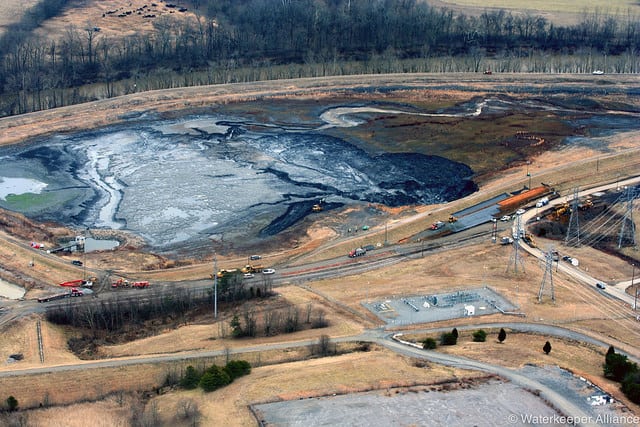North Carolina’s governor has vetoed a coal ash bill backed by Duke Energy that would have reinstated the recently dissolved Coal Ash Management Commission.
Senate Bill 71 (SB71), introduced in February 2015, has passed both houses. Some media sources suggest that lawmakers have enough votes to override the veto.
The bill seeks to re-establish the commission tasked, under the 2014 Coal Ash Management Act, with overseeing clean up and closure of 32 North Carolina coal ash ponds owned by Duke Energy. Gov. Pat McCrory disbanded the seven-member commission earlier this year after the North Carolina Supreme Court ruled 6–1 that legislative appointments to the commission were unconstitutional.
SB71 sought to grant the governor the authority to appoint five commission members, who would be confirmed by lawmakers. It would have also amended the 2014 Coal Ash Management Act to provide permanent alternative water supplies to residents living near coal ash sites with contaminated wells, whether or not toxins can be proven to have come from ash ponds. The bill covers more than 900 wells.
Duke Energy disputes that its coal ash basins are contaminating wells. “Extensive science and engineering studies demonstrate that basins are not impacting neighbor wells,” it said. However, the company said the bill is favorable: “[E]xtending a permanent water supply to those neighbors benefits all customers because it preserves the wide range of closure options,” it said.
According to the company, the bill has broad support from environmental and business communities in the state. Meanwhile, the bill essentially strengthens the state’s 2014 Coal Ash Management Act because it ensures the “state has the flexibility to make the best decisions to safely close ash basins,” it said.
But Gov. McCrory’s office on June 6 said, as it announced the veto, that SB71 “weakens environmental protections, delays water connections for well owners, ignores dam safety, hinders efforts to reuse coal ash and violates the state constitution.”
In addition to the veto, the McCrory administration said it would ask a court to require Duke Energy to meet an “accelerated timeline” for connecting alternate water supplies. An alternative solution proposed by the governor requires new water connections for affected residents within 18 months. “The administration will also seek a court order to ensure that dam repairs are completed and coal ash is reused in an environmentally sound way,” it said.
“This bill clearly continues to violate the separation of powers by re-establishing unaccountable bureaucracies that have the power to make or overrule executive decisions,” it added.
But for Duke Energy, the veto is contradictory. “We don’t understand why the Governor would veto a bill that makes North Carolina’s Coal Ash law even stronger. Very importantly, it reconstitutes a Commission that will evaluate the safety and cost of any closure plan on customers,” the utility said on June 6.
The state’s unique coal ash management actions were established in response to the 2014 accident at a Duke Energy coal plant in Eden, N.C., which spilled up to 39,000 tons of coal ash into the Dan River.
The company has since embarked on a plan to close all its ash basins in the state within the next decade, and to reuse or recycle ash at all plants.

—Sonal Patel, associate editor (@POWERmagazine, @sonalcpatel)










